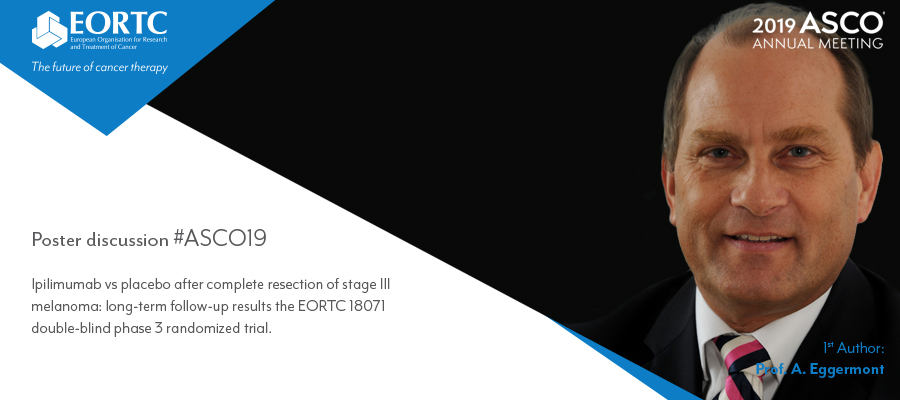Sustained long term survival benefit with adjuvant ipilimumab in patients with high risk stage III melanoma
1 Jun 2019
Chicago, USA: Long term follow up results from the EORTC 18071 double blinded phase 3 randomized trial comparing ipilimumab and placebo were presented today at the ASCO 2019 annual meeting in Chicago USA. The results showed that ipilimumab administered as adjuvant therapy provided a sustained prolonged recurrence-free survival, distant metastasis-free survival and overall survival of patients with high-risk stage III melanoma.
As reported by Eggermont et al in 20161, the adverse events with ipilimumab, administered at a dose of 10 mg/Kg, in adjuvant therapy was high compared to the placebo, leading to treatment discontinuation due to adverse events in 53.3% of the patients. Immune-related Adverse Events (irAE) were a significant problem, especially grade 3-4 irAEs such as colitis, hepatitis, hypophysitis with 5 drug-related deaths (1.1%). The majority of adverse events were resolved within 4 to 8 weeks using established management guidelines, and in spite of a discontinuation rate of 53.4% it was deemed that the drug did not have a negative effect on the overall health-related quality of life of the patient2.
In this study, 951 patients who underwent complete resection of stage III cutaneous melanoma were randomized (stratified by stage and region) to ipilimumab at 10 mg/kg (n = 475) or placebo (n = 476) q3w for 4 doses, then every 3 months for up to 3 years until completion, disease recurrence, or unacceptable toxicity.
Overall, patients were defined with the following stratification, 20% AJCC-7 stage IIIA, 44% stage IIIB, and 36% stage IIIC. In addition, 42% had an ulcerated primary melanoma, and 58% macroscopic lymph node involvement. Median follow-up was 6.9 years. The follow up results showed that recurrence- free survival, distant metastasis-free survival and overall survival of patients observed in the ipilimumab group was long-lasting (8.7% difference for overall survival rate at 7 years from randomization) as compared to the placebo group, and was consistent across subgroups.
“These long term follow-up results are important as we have firmly established that adjuvant therapy with the first immune checkpoint inhibitor, ipilimumab, provides sustained and durable survival benefit,” says Professor Alexander M.M. Eggermont, leading investigator of the study and General Director of Institute Gustav Roussy, Villejuif/Paris-Sud, France. “This is encouraging, for what we now may expect to see, is overall survival benefits from more recently conducted trials with the more effective and less toxic anti-PD1 molecules, such as nivolumab and pembrolizumab 3, 4.”
“The conduct of this EORTC 18071 randomized trial was outstanding in terms of collaboration between the EORTC HQ, the sponsor (BMS), different CROs and a very large network of institutions,” says Stefan Suciu, lead statistician at the EORTC HQ. “We succeeded to publish the main results in two major journals using the database located at the EORTC HQ. Additional side-studies are planned”.
“Currently over 20 000 patients, who have participated in clinical trials at EORTC, are being followed up. This study highlights EORTC’s constant quest to gather data even after the study is closed to understand the likelihood of treatment’s trajectory on patients,” says Dr Vassilis Golfinopoulos, EORTC HQ Director, Brussels, Belgium. “These long-term follow up studies provided invaluable information to treating clinicians on the expectations of the drug for the patient.”
Abstract number: #2512
Ipilimumab vs placebo after complete resection of stage III melanoma: long-term follow-up results the EORTC 18071 double-blind phase 3 randomized trial. Alexander M. M. Eggermont, Vanna Chiarion-Sileni, Jean-Jacques Grob, Reinhard Dummer, Jedd D. Wolchok, Henrik Schmidt, Omid Hamid, Caroline Robert, Paolo Antonio Ascierto, Jon M. Richards, Celeste Lebbe, Virginia Ferraresi, Michael Smylie, Jeffrey S. Weber, Michele Maio, Fareeda Hosein, Veerle de Pril, Michal Kicinski, Stefan Suciu, Alessandro Testori
(1) Eggermont AMM, Chiarion-Sileni V, Grob JJ, et al. Prolonged survival with Ipilimumab as adjuvant in stage III melanoma. New Engl J Med 2016; 375: 1845-1855.
(2) Coens C, Suciu S, Chiarion-Sileni V et al. Health-related quality of life with adjuvant ipilimumab versus placebo after complete resection of high-risk stage III melanoma (EORTC 18071): secondary outcomes of a multinational, randomised, double-blind, phase 3 trial. Lancet Oncol. 2017;18:393-403.
(3) Weber J, Mandala M, Del Vecchio M, et al. Adjuvant Nivolumab versus Ipilimumab in Resected Stage III or IV Melanoma. N Engl J Med. 2017; 377: 1824-1835.
(4) Eggermont AMM, Blank CU, Mandala M, et al. Adjuvant Pembrolizumab versus Placebo in Resected Stage III Melanoma. N Engl J Med. 2018 ;378: 1789-1801.
Related News
EORTC: Advancing research and treatment for rare cancers
29 Feb 2024
EORTC Fellowship Programme: celebrating more than 20 years of impactful collaboration
22 Feb 2024
Appointment of Malte Peters as EORTC Strategic Alliance Officer
9 Feb 2024
Unique series of workshops in partnership with the European Medicines Agency (EMA)
7 Feb 2024
EORTC launches a prominent clinical trial in older patients with locally advanced (LA) HNSCC (Head and Neck Squamous Cell Carcinoma)
14 Dec 2023
Seven IMMUcan abstracts selected for ESMO Immuno-Oncology Congress 2023
6 Dec 2023
EORTC Quality of Life measures integrated in CDISC
20 Nov 2023
EORTC and Immunocore are collaborating to launch the ATOM clinical trial of tebentafusp in Adjuvant Uveal Melanoma
7 Nov 2023
Treatment with decitabine resulted in a similar survival and fewer adverse events compared with conventional chemotherapy in older fit patients with acute myeloid leukaemia
31 Oct 2023
New results and forthcoming EORTC trials in rare cancers, lung, head and neck, and breast carcinomas presented at ESMO 2023
20 Oct 2023


